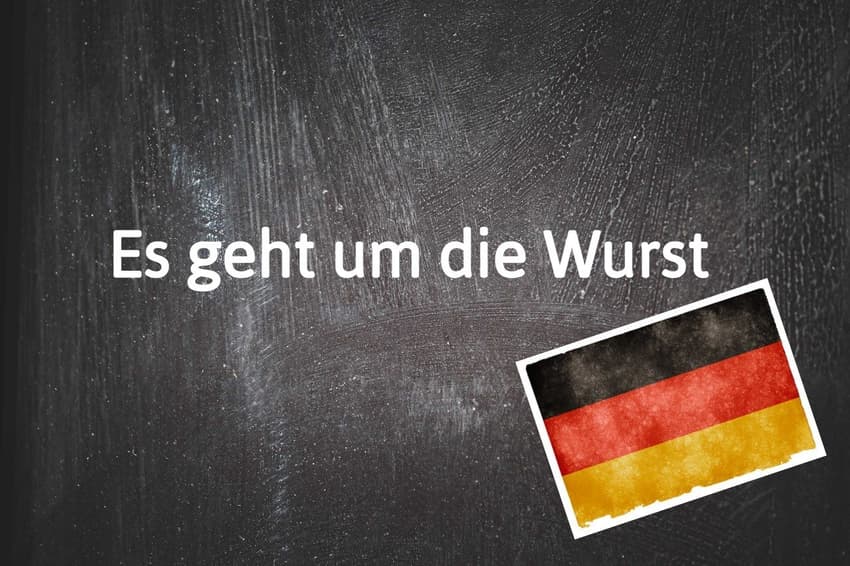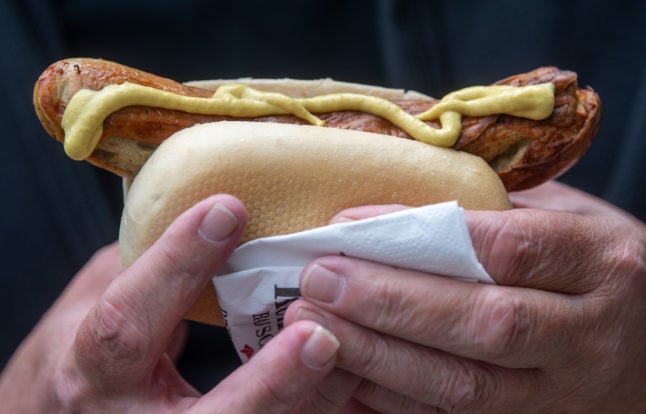German phrase of the day: Es geht um die Wurst

This phrase combines a winning resolution with the German love of processed meat.
Why do I need to know Es geht um die Wurst?
Because you can’t truly understand German until you embrace its sausage culture. And this idiom is the hilarious and inspiring little pep talk that gets to the heart of Germany's language, food, and history.
What does it mean?
Es geht um die Wurst or Jetzt geht's um die Wurst (pronounced like this) is a colloquial phrase that translates to 'it's all about the sausage' or ‘now it’s about the sausage’. In English, it means that something is very important - 'It's crunch time’, ‘now it's getting serious’, 'it's now or never' or ‘it's the moment of truth’ .
This expression is used during a moment when you need to give it everything you have - whether it’s a competition, a game or a life-and-death duel. And the prize has always been, metaphorically speaking, sausages.
It’s the sort of phrase you would utter before you walk into the interview room for your dream job, or when you were down to your last card playing UNO, or perhaps when watching the penalty shootout of Germany at a World Cup final.
But why sausage? It's down to the historical importance of sausages in Germany.
READ ALSO: 'More than a sausage': Germany's Currywurst Museum closing after 10 years

A Bratwurst coated in mustard. Photo: picture alliance/dpa/dpa-Zentralbild | Hendrik Schmidt
The first documented use of this phrase was in Leipzig in 1881, but its origins are thought to date back much further.
Throughout this period in Germany's history, fairs, beer festivals, and carnivals were becoming increasingly popular in many towns and villages across the country.
Many games and competitions were set up for the occasion. Rather than a cash prize, large and high-quality sausages were awarded to the winner. Unlike today, sausages were labour-intensive and expensive commodities, rich in nutrients and fats, reserved only for the higher classes.
To the peasants of the time, it could easily be worth several days, if not weeks, of wages. Winning sausages was not only a great way to earn extra money but also a tremendous treat for the family, giving them a secure food source. It is the modern equivalent of a jackpot, so people were serious and put their hearts into it. Hence, the phrase highlighting that it really is all about the sausage!
Use it like this:
Ich habe meine Prüfungsergebnisse bekommen. Es geht um die Wurst!
I've received my exam results. It's the moment of truth!
Deutschland steht im Finale, jetzt geht es um die wurst.
Germany is in the final, now it's crunch time.
Comments (1)
See Also
Why do I need to know Es geht um die Wurst?
Because you can’t truly understand German until you embrace its sausage culture. And this idiom is the hilarious and inspiring little pep talk that gets to the heart of Germany's language, food, and history.
What does it mean?
Es geht um die Wurst or Jetzt geht's um die Wurst (pronounced like this) is a colloquial phrase that translates to 'it's all about the sausage' or ‘now it’s about the sausage’. In English, it means that something is very important - 'It's crunch time’, ‘now it's getting serious’, 'it's now or never' or ‘it's the moment of truth’ .
This expression is used during a moment when you need to give it everything you have - whether it’s a competition, a game or a life-and-death duel. And the prize has always been, metaphorically speaking, sausages.
It’s the sort of phrase you would utter before you walk into the interview room for your dream job, or when you were down to your last card playing UNO, or perhaps when watching the penalty shootout of Germany at a World Cup final.
But why sausage? It's down to the historical importance of sausages in Germany.
READ ALSO: 'More than a sausage': Germany's Currywurst Museum closing after 10 years

The first documented use of this phrase was in Leipzig in 1881, but its origins are thought to date back much further.
Throughout this period in Germany's history, fairs, beer festivals, and carnivals were becoming increasingly popular in many towns and villages across the country.
Many games and competitions were set up for the occasion. Rather than a cash prize, large and high-quality sausages were awarded to the winner. Unlike today, sausages were labour-intensive and expensive commodities, rich in nutrients and fats, reserved only for the higher classes.
To the peasants of the time, it could easily be worth several days, if not weeks, of wages. Winning sausages was not only a great way to earn extra money but also a tremendous treat for the family, giving them a secure food source. It is the modern equivalent of a jackpot, so people were serious and put their hearts into it. Hence, the phrase highlighting that it really is all about the sausage!
Use it like this:
Ich habe meine Prüfungsergebnisse bekommen. Es geht um die Wurst!
I've received my exam results. It's the moment of truth!
Deutschland steht im Finale, jetzt geht es um die wurst.
Germany is in the final, now it's crunch time.
Join the conversation in our comments section below. Share your own views and experience and if you have a question or suggestion for our journalists then email us at [email protected].
Please keep comments civil, constructive and on topic – and make sure to read our terms of use before getting involved.
Please log in here to leave a comment.